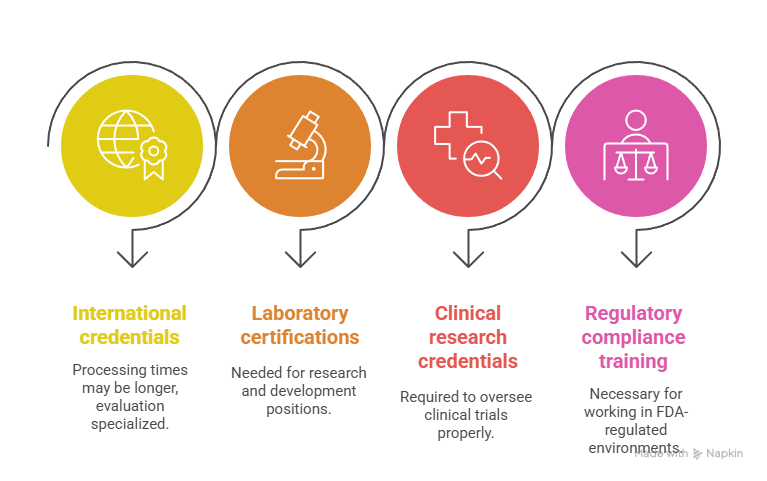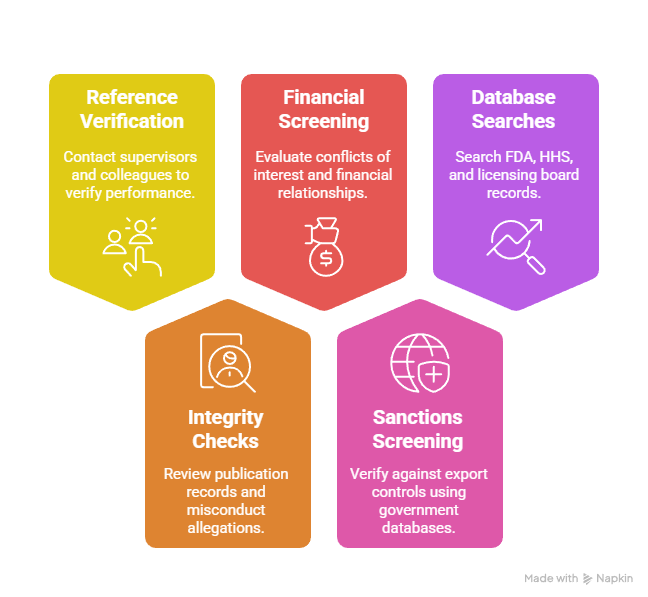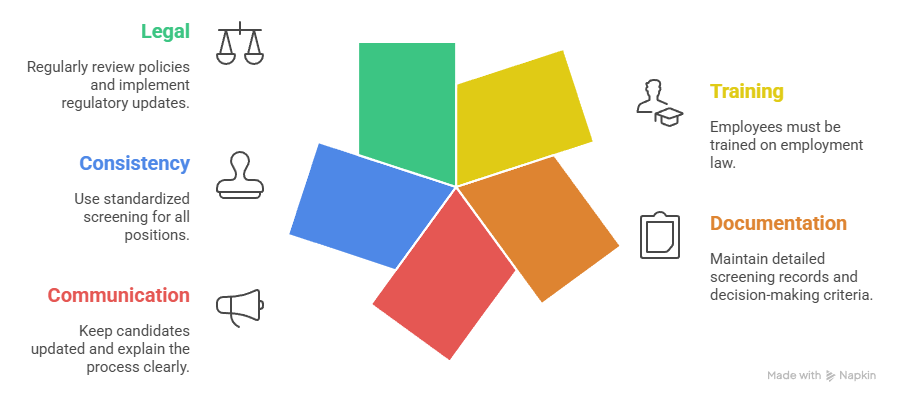California biotech background checks must comply with stringent state regulations including CCPA, Ban the Box laws, and industry-specific requirements that protect both employer interests and candidate privacy rights. Successful biotech screening in California requires understanding the intersection of federal FCRA guidelines, state privacy laws, and life sciences industry standards for maintaining compliant hiring processes.
Key Takeaways
- California biotech companies must implement CCPA-compliant background screening processes that provide candidates with explicit data privacy notifications and consent mechanisms.
- State Ban the Box legislation prohibits initial criminal history inquiries until after conditional job offers, requiring strategic timing adjustments for biotech hiring workflows.
- Life sciences background checks in California typically include education verification, employment history, criminal records, and specialized FDA database searches for regulated positions.
- CCPA grants California residents specific rights regarding personal data collection, including the right to know what information is gathered during background screening processes.
- Biotech screening timelines in California range from 3-10 business days depending on verification complexity and international education or employment history requirements.
- Professional consultation with California employment law specialists ensures biotech companies maintain compliant hiring practices while meeting industry-specific security and safety requirements.
California Biotech Background Check Requirements and Legal Framework
California's biotech industry operates under a complex regulatory environment. This environment demands comprehensive background screening while maintaining strict compliance with state privacy laws. The California Consumer Privacy Act (CCPA) fundamentally changed how biotech companies collect, process, and store candidate personal information during the hiring process.
Under CCPA regulations, biotech employers must provide detailed privacy notices. These notices explain what data will be collected, how it will be used, and candidate rights regarding their personal information. The Fair Credit Reporting Act (FCRA) provides the federal foundation for background screening. However, California's additional protections create unique compliance challenges for life sciences organizations.
California biotech background checks must navigate Ban the Box legislation. This legislation restricts when criminal history inquiries can occur during the hiring process. Additionally, the state's Unruh Civil Rights Act and Fair Employment and Housing Act impose specific anti-discrimination requirements. These requirements affect screening criteria and decision-making processes.
Essential Components of Biotech Screening in California
Education and Credential Verification Standards
California biotech companies require rigorous education verification due to the technical nature of life sciences positions. Regulatory oversight from agencies like the FDA and OSHA makes this verification essential. Education verification for biotech roles typically includes degree confirmation, transcript review, and professional certification validation.

- International credentials: Extended processing times and specialized evaluation services
- Laboratory certifications: Required for research and development positions
- Clinical research credentials: Mandatory for clinical trial oversight roles
- Regulatory compliance training: Essential for FDA-regulated environments
International education verification adds complexity. This often requires credential evaluation services and extended processing times. The verification process also encompasses specialized certifications relevant to pharmaceutical and biotech work.
Criminal Background Screening Compliance
California's Ban the Box law significantly impacts biotech hiring by prohibiting criminal history inquiries until after conditional job offers. This timing restriction requires biotech companies to adjust their screening workflows. Furthermore, hiring managers must receive proper training on compliant interview practices.
When criminal screening is permitted, California law requires individualized assessments. These assessments consider the nature of offenses, time elapsed, and job relevance. Consequently, biotech employers must document their decision-making processes and provide candidates with adverse action procedures that comply with both FCRA and California state requirements.
Professional Reference and Employment History
Professional reference verification involves direct contact with previous supervisors and colleagues. This process verifies work performance and integrity within the biotech sector. Employment history verification confirms job titles, dates of employment, and reasons for departure from previous positions.
Reference checks for biotech positions often focus on technical competencies and regulatory compliance experience. Additionally, they evaluate candidates' ability to work in highly regulated environments. Employment gaps require explanation and documentation to ensure comprehensive evaluation of candidate backgrounds.
CCPA Compliance Integration with Background Screening
The California Consumer Privacy Act grants biotech job candidates specific rights regarding personal information collection. These rights apply throughout background screening processes. Candidates have the right to know what categories of personal information will be collected. They also have rights regarding the sources of that information and the business purposes for collection. CCPA compliance requires biotech employers to implement data retention policies that specify how long background check information will be stored. Companies must also establish procedures for handling candidate requests to access, delete, or correct their personal information.
| CCPA Requirement | Implementation | Timeline |
| Privacy Notice | Before data collection | Pre-screening |
| Consent Collection | Explicit candidate agreement | Application stage |
| Data Retention | Specified storage periods | Post-hiring |
| Deletion Requests | Candidate-initiated removal | Within 45 days |
These requirements necessitate robust data management systems and staff training on privacy compliance protocols. Moreover, companies must ensure ongoing compliance monitoring and regular policy updates.
Industry-Specific Screening Considerations for Life Sciences
California's life sciences sector faces unique background screening requirements. Federal regulatory oversight creates additional compliance obligations. The sensitive nature of pharmaceutical research and development work demands enhanced verification procedures. FDA regulations may require additional screening components for positions involving drug development, clinical trials, or manufacturing operations. Companies involved in controlled substance research or manufacturing face additional DEA background check requirements. These enhanced screening measures protect both company interests and public safety while ensuring compliance with federal regulatory expectations. Furthermore, specialized requirements often include research integrity checks, financial disclosure screening, and international sanctions screening.

- Professional reference verification: Direct supervisor and colleague contact for performance verification
- Research integrity checks: Publication records and misconduct allegation review
- Financial disclosure screening: Conflict of interest and financial relationship evaluation
- International sanctions screening: OFAC and government database verification against export controls
- Specialized database searches: FDA debarment lists, HHS exclusion databases, and licensing board records
These comprehensive screening measures ensure regulatory compliance while protecting public safety interests. Additionally, they help maintain industry standards and corporate reputation within the competitive biotech sector.
Background Check Timeline and Process Management
California biotech background check processing times vary significantly based on verification complexity. The scope of screening requirements also influences processing speed. Standard domestic verification typically requires 3-5 business days. In contrast, international components can extend timelines to 7-10 business days. Factors that influence processing speed include previous employer responsiveness, international credential requirements, and multi-jurisdictional criminal record searches.
Companies can optimize timelines by implementing efficient candidate communication processes. Working with experienced screening providers who understand California-specific requirements also helps. Clear timeline expectations help manage candidate experience while ensuring thorough verification processes. Additionally, proactive communication prevents candidate anxiety and maintains positive hiring relationships throughout the screening period.
Managing Delays and Complications
Background screening delays commonly occur due to unresponsive previous employers. International verification requirements and incomplete candidate information also cause delays. Biotech companies should establish clear communication protocols for managing delays while maintaining candidate engagement throughout the process.
Documentation requirements become particularly important when delays occur. Candidates may have questions about processing times and next steps. Transparent communication about delay causes and expected resolution timeframes helps maintain positive candidate relationships while demonstrating professional hiring practices.
Vendor Selection and Cost Considerations
California biotech companies typically invest $50-150 per candidate for comprehensive background screening. Costs vary based on verification scope and international requirements. Premium screening packages that include specialized database searches command higher fees but provide enhanced risk mitigation for sensitive positions.
| Screening Package | Cost Range | Included Components |
| Basic Verification | $50-75 | Education, employment, criminal |
| Standard Plus | $75-100 | Basic plus references and licensing |
| Comprehensive | $100-150 | All components plus international and specialized searches |
Vendor selection should prioritize CCPA compliance capabilities and California employment law expertise. Industry-specific screening experience also proves essential for biotech hiring success.
Best Practices for Biotech Hiring Managers
Successful California biotech background screening requires coordinated efforts between hiring managers, HR professionals, and legal compliance teams. Hiring managers should receive comprehensive training on California employment law requirements. This training must include Ban the Box compliance and anti-discrimination protocols. Clear screening criteria help ensure consistent application of background check policies across all candidates and positions.
Documentation practices become particularly important in California's regulatory environment. Candidates have enhanced rights to access information about hiring decisions. Therefore, companies must maintain detailed records of screening processes, decision-making criteria, and any adverse actions taken based on background check results. These records support compliance demonstrations and provide protection in case of legal challenges. Communication strategies should emphasize transparency and candidate experience throughout the screening process. Proactive updates on processing status contribute to positive hiring experiences while demonstrating professional organizational practices.

- Training requirements: California employment law, CCPA compliance, and anti-discrimination protocols
- Documentation standards: Detailed screening records and decision-making criteria
- Communication protocols: Regular candidate updates and transparent process explanations
- Consistency measures: Standardized screening criteria across all positions and candidates
- Legal compliance: Regular policy reviews and regulatory update implementation
Regular policy reviews ensure ongoing compliance with evolving California regulations. Additionally, continuous improvement processes help optimize screening efficiency while maintaining thorough verification standards.
Technology Integration and Data Management
Modern biotech background screening relies heavily on integrated technology platforms. These platforms streamline data collection, verification processes, and compliance monitoring. CCPA compliance requires sophisticated data management systems that track personal information throughout the screening lifecycle. Additionally, these systems must provide audit trails and support candidate rights requests efficiently.
Cloud-based screening platforms offer scalability and security advantages for growing biotech companies. They also provide real-time status updates and automated compliance monitoring features. Integration with existing HR information systems creates seamless candidate experiences while reducing administrative burden on hiring teams. Furthermore, automated workflows help ensure consistent application of screening policies and reduce human error risks.
Security and Data Protection Measures
Data security becomes paramount when handling sensitive candidate information during background screening. Biotech companies must implement encryption, access controls, and regular security audits. These measures protect against data breaches and ensure ongoing CCPA compliance.
Multi-factor authentication and role-based access controls limit system access to authorized personnel only. Regular security training helps employees understand their responsibilities for protecting candidate data. Additionally, incident response procedures ensure rapid containment and notification in case of security breaches.
Regulatory Updates and Future Considerations
California's regulatory landscape continues evolving with new privacy protections and employment law requirements. Biotech companies must stay current with legislative changes that affect background screening practices. Recent amendments to CCPA and emerging AI bias legislation create additional compliance obligations. These changes require ongoing attention and policy adjustments to maintain regulatory compliance.
The California Privacy Rights Act (CPRA) expands upon CCPA requirements. It introduces new categories of sensitive personal information and enhanced consumer rights. Biotech employers must understand how these changes affect their screening processes. Moreover, they must implement necessary system updates and policy modifications to ensure ongoing compliance.
Future regulatory trends suggest increased focus on algorithmic bias and automated decision-making in hiring. Biotech companies using AI-powered screening tools must prepare for potential new requirements. Additionally, they should implement bias testing and fairness monitoring procedures proactively. Regular legal consultation helps companies anticipate regulatory changes and implement necessary adjustments before compliance deadlines.
Conclusion
California biotech background check requirements demand sophisticated understanding of state privacy laws, federal regulations, and industry-specific compliance obligations. CCPA compliance adds complexity to traditional screening processes but provides important protections for candidate privacy rights. Successful biotech screening programs balance thorough verification requirements with efficient processes that support competitive hiring timelines. Professional consultation with California employment law specialists helps ensure ongoing compliance while adapting to evolving regulatory requirements.
Frequently Asked Questions
What specific background checks are required for biotech positions in California?
California biotech positions typically require education verification, employment history confirmation, criminal background screening (after conditional offer), and professional reference checks. Specialized roles may need additional FDA database searches, research integrity verification, and professional licensing confirmation depending on job responsibilities and regulatory oversight requirements.
How long do California biotech background checks typically take to complete?
Standard California biotech background checks usually take 3-7 business days for domestic verification, with international components extending timelines to 7-10 business days. Processing speed depends on verification complexity, previous employer responsiveness, international education or employment history, and the scope of required screening components.
How does CCPA affect biotech background screening processes in California?
CCPA requires biotech companies to provide detailed privacy notices explaining data collection purposes, obtain explicit candidate consent, and establish procedures for handling privacy rights requests. Companies must implement data retention policies, ensure vendor compliance, and provide candidates with rights to access, delete, or correct their personal information collected during screening.
When can California biotech companies ask about criminal history during hiring?
Under California's Ban the Box law, biotech companies cannot inquire about criminal history until after making a conditional job offer. Some positions may qualify for exemptions under security-sensitive role classifications, but most biotech positions must follow the standard conditional offer requirement before conducting criminal background screening.
What are the typical costs for comprehensive biotech background screening in California?
California biotech background screening typically costs $50-150 per candidate depending on verification scope and complexity. Basic packages start around $50-75, while comprehensive screening including international verification, specialized database searches, and expedited processing can reach $100-150 per candidate.
Are there special FDA requirements for biotech background checks in California?
FDA-regulated positions may require additional screening components including debarment list checks, research integrity verification, and enhanced employment history validation. Clinical research positions, drug manufacturing roles, and regulatory affairs positions often need specialized database searches and more extensive verification procedures to ensure regulatory compliance.
Additional Resources
- California Consumer Privacy Act (CCPA) Compliance Guide for Employers
https://oag.ca.gov/privacy/ccpa - Federal Trade Commission FCRA Guidelines for Employment Screening
https://www.ftc.gov/enforcement/rules/rulemaking-regulatory-reform-proceedings/fair-credit-reporting-act - California Department of Fair Employment and Housing Background Check Guidelines
https://www.dfeh.ca.gov/employment/ - FDA Guidance on Employee Background Checks for Drug Manufacturing
https://www.fda.gov/regulatory-information/search-fda-guidance-documents - Society for Human Resource Management (SHRM) California Employment Law Updates
https://www.shrm.org/resourcesandtools/legal-and-compliance/state-and-local-updates/pages/california.aspx - National Association of Professional Background Screeners California Resources
https://www.napbs.com/ - California Chamber of Commerce Employment Law FAQ
https://www.calchamber.com/hrcalifornia/
